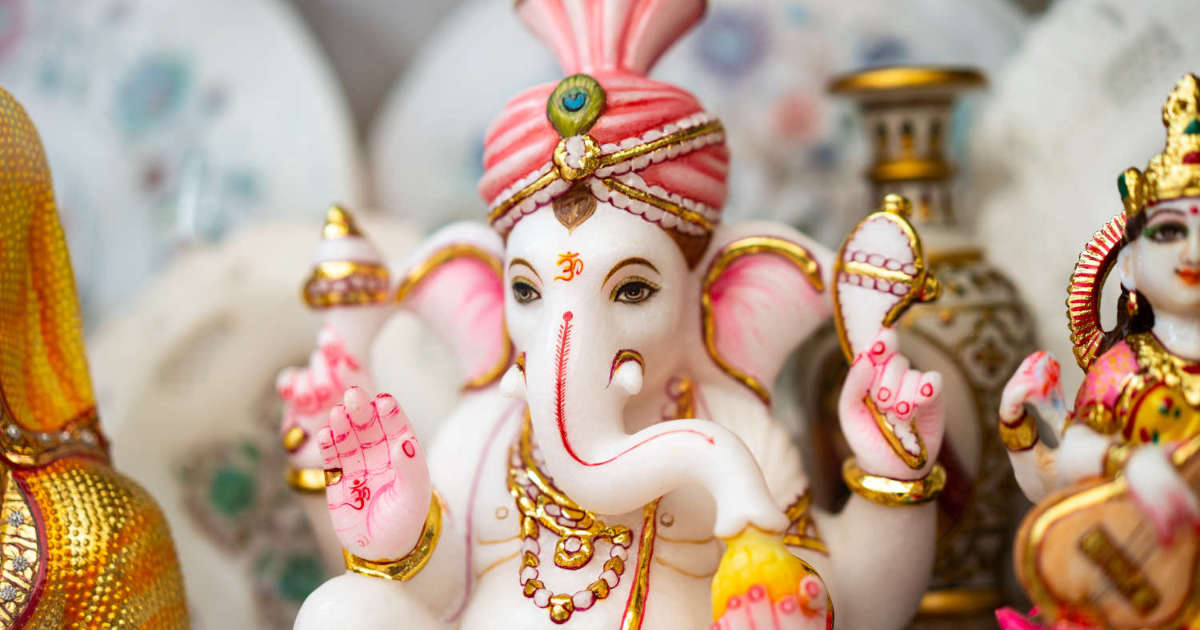One wishes to attract the attention of an entity one can see but one does not know his name. One uses a word or a sound to attract his attention. He comes over and says that his name is so and so and was one seeking him. Similarly, God himself in the role of the Guru discloses himself to the pilgrim wandering in search of a guide. In the ultimate analysis the pilgrim is one with the name and with the Guru. How can it be otherwise? He alone can impart the gift of his name and none but he himself can sustain the knowledge of his name. As explained by Sri Anandamayi Ma. Continue reading
Tag Archives: self realization
136 – Who is Ganesha
Ma Shakti created Ganesha. She did not desire a son, she created him to be her protector. After Shiva beheaded Ganesha in a fearsome rage, there was pandemonium in the universe. Parvati assumed the form of Kali and was prepared to destroy and devour all the worlds. The Gods and devas were terrified, and the Gods said that they will have to give him some of their attributes. Shiva called him Ganesha which means ruler, gana means a group of people and isha means master. Continue reading
Overcoming anger with the vedic method of Neti-Neti | Pot-clay discimination to realise the self
 What is superimposition?
What is superimposition?
How do you discriminate between your true self and what you belief to be your self. Learn the vedic method of ‘Neti-Neti’. Don’t identify with your body. Why did Arjuna choose Krishna instead of getting a big army in the battle? Arjuna struggels when he sees who he is supposed to fight against. He gets unhappy, doesn’t want to fight. This is our situation: We are unhappy and are searching a fundamental method to get happy in life. Perception from senses is unreal. We need to restrain our senses, to see the reality. Pot-clay comparison. What changes, doesn’t exist. The ‘I’ doesn’t change, everthing that changes – emotions, personality, job – are names and forms. They appear to be real. But names and forms aren’t real. All we know is a product of a word and an appearance. They are passing. They don’t exist. You are unaffected by everything in this dream. All ideas are in your mind, just like in the dream. The only reality in the dream is the consciousness that we call ‘I’. Here is only consciousness, not mine, not you. Consciousness can’t be heard, touched. But it is self-illuminate. You know it exists. You’ll become more tolerant and less pulled by thoughts and objects. Listen to the sprinkling talk of Chandra Cohen for beginners. With humour and convincing arguments.
MORE VEDANTA ON OUR CHANNEL: Vedanta by Chandra Cohen
You are welcome to send a donate. Support our ashram with any amount. Thanks for your charity! Donate here
Om Shanti 🕉
Value management and attaining unconditional love – James Swartz – Yoga of Love, Bhakti Sutra
In the satsang we create a sattvic atmosphere that makes it easier
to focus on the knowledge. It is important to keep the knowledge
active when the mind is rajasic or tamasic. When the values are
assimilated the mind stays sattvic and the knowledge stays active.
A change in your lifestyle may be necessary to make the mind
sattvic enough. Deliberate thinking is observing the mind, step
back and think about it before you act. If necessary pause, collect
your thoughts, you can edit your thoughts as they come up. Pay
attention that the information is appropriate, kind, timely and
credible. Impulsive thinking has the need to react immediately. 11.
Dispassion towards sense objects, for example music, food, sex. No
obsession, except obsession for Vedanta. Assimilating these values,
starting with an intellectual understanding brings you a lot of
experiential and emotional satisfaction. 12. Renunciation and
Austerity. Eagerness to get rid of things and to live simply. Do not
accumulate stuff. 13. Absence of egoism. It’s about a simple
recognition about the difference between my (real) Self and the ego
(reflected self). Sadhana: Whenever you say the ‘I’ in the day-to-day
activities ask yourself which ‘I’ is meant. This helps to
discriminate. Keep track of your speech. Keep a short leash on your
ego and let it walk in front of you. 14. Appreciation of time. Don’t
waste time and go on with self-inquiry. 15. Absence of ownership. Is
it your body or your children? Everything comes from isvara.
Sadhana: Pay attention to the word ‘mine’. 16. Absence of
excessive attachment to loved ones. Serve the people in your field
with love but don’t get excessively attached. 17. Sameness of mind
under all circumstances. Cultivate the value of a quiet mind and for
sattva. Read the book Yoga of the three energies. Importance of
the management of the gunas. You can remove most of the
physical pain with guna management. Most of the daily pains are
caused by blocked prana or tamasic energy. 18. Non-dual devotion
to God. 19. Love of solitude. You can hear the silence speaking.
Gradually work to it if you have a busy life. 20. Absence of craving
for company. People can be in your life but you should have no
need for it. 21. Constant practice of self-knowledge. 22. Value for
completing or resolving things. Too much agitation prevents you
from finishing projects and brings to starting new ones. Karma yoga
reduces your karmic load. The degree to what you reduce your
karmic load is the degree to what your mind is peaceful. Tamasic
people don’t want to complete things. Rajasic people want to
complete things but they are too busy to do the completion.
Consequence is that they are always agitated. 23. Precaution,
deliberation and restraint. Think ahead and make a plan before you
judge. Value for holding back. Rajasic people want to do things
immediately. If you can’t hold on you find yourself doing a lot of
things you don’t have to do. 65. Offering all activities to the Lord,
one should direct negative feelings – desire, anger and pride – to
Him. 66. Transcending the gunas, the devotee should act only out
of pure love of God and remain perpetually in the relationship of a
servant to his master or a lover serving her beloved. 67. Among the
Lord’s devotees, the greatest are those who are dedicated solely as
intimate servants. Sakhya bhava and further bhavas. Secret love
affair with God behind the back of your husband. What is your
dominant way to express your love? Love with understanding is
better than only emotional love, for example sakhya bhava. 68.
Conversing among one another with throats choked, hair
standing on end and tears flowing, the Lord’s intimate servants
purify their own followers and the whole world. 69-83. 84. Anyone
who has faith in these auspicious teachings will attain non-dual
devotion. Indeed he or she will attain unconditional love.
More: Vedanta Seminars.
More on: Vedanta.
Learn more about: Yoga Vidya.
You can sign up for: our online seminars.
You can also support us by: donating.
Podcast: Play in new window | Download
Subscribe: RSS
Jealousy, consistent effort and mastery of the mind – James Swartz – Yoga of Love, Bhakti Sutra
These values are qualifications for moksha. When you are
spiritually stuck it’s probably because one or more spiritual values
are only partially assimilated. When you are not up to the mark,
pick a value and work on it for 1-2 months. It’s a constant practice.
When you find a consistent pattern of frustration, anger or
depression there is some value that needs work. Apply the opposite
value. If you are a selfish person then learn how to be generous.
Value management is extremely important. 8. Jealousy and Envy:
Rajas is the problem. Don’t compare yourself to others. If you don’t
know who you are the bad values are obstacles and the good
values are helpful. Pay attention with comparisons that make you
feel inferior. Nobody is trying to make you feel inferior. You have to
make yourself feel inferior or superior. Comparison leads to
competition and competition leads to violence, anger and
sometimes destruction. Jealousy and Envy are transformed anger
and they usually lead to depression. You are never jealous of a
whole person only of an aspect. In other words, jealousy is a
projection that masks an insufficient appreciation of my own nature
and the abundance of good qualities that spring from it. A self-realized
person is never jealous, because she is mindful of her
fullness. The Bible’s statement that God is “a jealous God” means
that when you know God you cannot love anything else. Shiva
means what is always good at any place and time, that’s me the
self. Ask yourself: ‘Why do I feel guilty?’. Without following dharma you
won’t get enlightened. When I feel jealousy I should apply the
opposite thought. If you realise that you are greedy try to be
generous. Give 5 or 10 Euros to a beggar. When you break one of
isvaras rules you should feel guilty. 9. A consistent effort to achieve
a stated goal is required for self-knowledge because self-knowledge
is not partial knowledge like worldly disciplines. Tapas with
steadiness and devotion over a long period of time is necessary for
self-realization. As the gunas are constantly changing the tapas
should take guna management into account. 10. Mastery of mind:
4 types of thinking. Impulsive, mechanical, deliberate thinking and
spontaneous thinking. Idea of instant gratification is a problem.
Fast food: I want my food immediately. The mantra of impulsive
people is: If it feels good do it. Better mantra: if it feels good think
about it before you do it. You are bored to death doing and thinking
the same things. Then you need entertainment, for example
different food every day: You live to eat. If your mind is mechanical
or impulsive it is not under your control. Convert these types of
thinking to deliberate thinking with the help of Vedanta. Applying
the opposite thought or always thinking from a non-dual
perspective. Intuition is normally impulsive thinking. Learn to think
like god from a perspective of love. Learn to think useful thoughts
and avoid useless thoughts. Channeling. Value of visions. Meaning
of angels and demons. Being separated from god is painful.
More: Vedanta Seminars.
More on: Vedanta.
Learn more about: Yoga Vidya.
You can sign up for: our online seminars.
You can also support us by: donating.
Podcast: Play in new window | Download
Subscribe: RSS
Gunas and value of values – James Swartz – Yoga of Love, Bhakti Yoga, Bhakti Sutra, Narada
1. Pride, Vanity, Conceit, Self-Glorification: Any form of hurt is due
to pride, an inflated ego, one that is excessively attached to what
it thinks it knows, believes, possesses or how it looks. When you
expect other people to make you feel good you are going to be
hurt because they do those things that make them feel good.
Often they waste time and energy trying to save face or plotting
revenge. Solution to these problems is inquiry into isvara. Where
did your special qualities come from. 2. Pretension, Affectation:
Claiming something that has no basis in fact. Creating fake
identies brings a lot of stress. Problem of judging your value in
comparison to other people. 3. Non-Injury: Mutual expectation of
non injury. It may be injury if vegetarians hurt the feelings of non
vegetarians. A bad thought doesn’t go to the other person. It stays
in your mind and hurts yourself. You should think the opposite
thought. Think before you speak or act. Only help people when
they ask you for help. 4. Accommodation, Commodiousness:
Making room for people in your life, being not too busy to pay
attention to other people. People want to be heard. At least you
can spend enough time to find out what others want from you.
Accomodation to the needs of others is a sign for a sense of nonduality.
If you are aiming for sainthood, non-injury and
accommodation are the minimum requirements. Wisdom and
scriptural knowledge are not necessary, only these values. 5.
Straightforwardness, Truthfulness. Your actions should be in line
with your thoughts. Diplomacy and manners are helpful to
communicate unpleasant information successfully. 6. Service to
the Teacher. By keeping your mind on the Self, doing your karma
yoga. The teacher has nothing to gain. Teacher wants to share the
love of god with you. 7. Cleanliness: Outer cleanliness. A mind with
no secrets. Transparency. Being natural. The bad stuff was given
to you by isvara too. It is not your fault. When you acknowledge
your vulnerability and your selfishness you are over it.
More: Vedanta Seminars.
More on: Vedanta.
Learn more about: Yoga Vidya.
You can sign up for: our online seminars.
You can also support us by: donating.
Podcast: Play in new window | Download
Subscribe: RSS
Gunas, devotion and values – James Swartz – Yoga of Love, Bhakti Yoga, Bhakti Sutra, Narada
How to overcome tamas? When you are rajasic and succesful you
When you are rajasic and succesful you
have no time to pay attention to yourself. Stuck in sattva. Danger
of vanity and stop of growth. Verse 58: “Success is easier to attain
by informal devotion than by any other means.” If you bring
discipline into your life you do things that are good for you and
your self esteem grows. Verse 59: “Devotion is easiest because it
does not depend on any other authority; it is self-validating.” In
Vedanta you have to live according to the scripture. Verse 60:
“Furthermore, devotion is the embodiment of peace and supreme
joy.” Verse 61: “Once all worldly and spiritual duties are consigned
to God, the devotee need not worry about gain and loss.” Ishvara
takes care of your worldly affairs. Do the best every day and then
see what happens. Manusha the one who thinks and worry. Verse
62: “To attain non-dual devotion, do not abandon responsibilities
in this world, but surrender the results of all actions to the
Lord.”Expression of Karma Yoga. When you give the actions to the
Lord then your worry stops. Karma Yoga and gratitude. Gratitude
as a sadhana. Honesty and purity. Verses 63, 64: “Don’t chase
money or entertain yourself with sex. Don’t compromise your
values and don’t quarrel with others. Relinquish false pride,
hypocrisy and other vices.” Fearless moral inventory is necessary.
12 step program. Sorting out spiritual and material values. Fully
assimilate the good values, renounce the bad values. In the
Bhagavad Gita the values are called knowledge.
More: Vedanta Seminars.
More on: Vedanta.
Learn more about: Yoga Vidya.
You can sign up for: our online seminars.
You can also support us by: donating.
Podcast: Play in new window | Download
Subscribe: RSS



